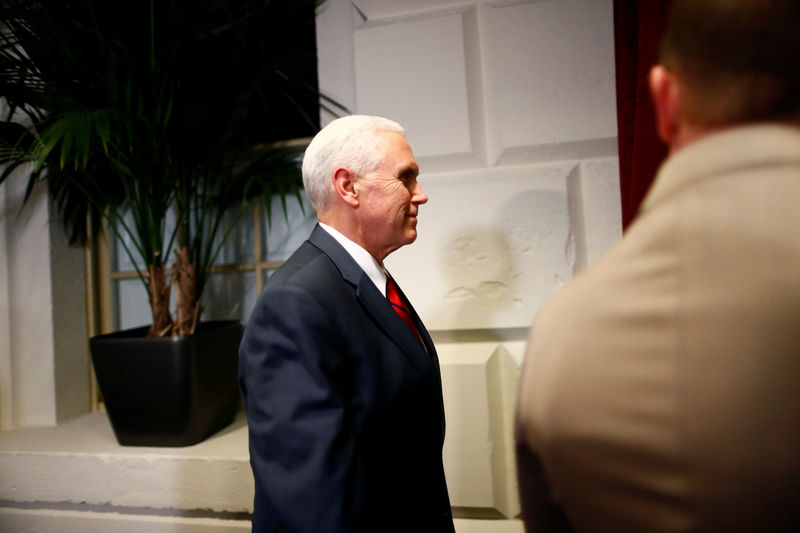Who is Kevin Hassett? Wolfe looks at the Trump ally tipped to become Fed Chair.
By David Morgan and Yasmeen Abutaleb
WASHINGTON (Reuters) - A U.S. House of Representatives vote to overhaul Obamacare before lawmakers leave Washington for a two-week break looked unlikely late on Tuesday as top White House deputies and key Republican groups said more discussions were needed.
Vice President Mike Pence and administration officials met on Capitol Hill for two hours with lawmakers from the moderate "Tuesday Group," the conservative Republican Study Committee, and the House Freedom Caucus, the rebel group of conservative lawmakers that derailed the first administration-backed healthcare bill last month.
While progress had been made, the officials and House lawmakers said no bill text had been agreed on and no decisions had been made by the various Republican factions.
The lack of a resolution complicates a White House push for a House vote on a healthcare proposal before Friday, when lawmakers return to their districts for two weeks.
“Good talk, good progress,” Pence told reporters without providing details.
Freedom Caucus leader Mark Meadows said the meeting had focused on an amendment to create a "backstop" to ensure individuals with chronic illnesses in high-risk pools do not see spikes in insurance premium costs if other aspects of Obamacare, also known as the 2010 Affordable Care Act, are repealed.
“No decisions were made. We’re going to get back together tomorrow at a time to be determined,” Meadows told reporters.
Republican Study Committee Chairman Mark Walker said the focus when talks resumed would be on sticking points such as whether to allow states to opt out of Obamacare mandates that insurers must cover a minimum tier of services and cannot charge more to those with pre-existing conditions - a popular provision of the law that Trump has promised to protect.
LEGISLATIVE TEST
The Republican failure last month to dismantle Obamacare was President Donald Trump's first major legislative setback and it raised questions about how he would build Republican consensus to deliver on other major legislative goals.
Many Republicans were elected on promises to repeal and replace Obamacare but House Speaker Paul Ryan was forced to withdraw the bill when it became clear there were not enough Republican votes to pass it.
Hard-line conservatives, such as those in the Freedom Caucus, thought it was too similar to former Democratic President Barack Obama's signature healthcare law. Moderate conservatives balked at proposed changes to some of its most popular provisions that were sought by conservative lawmakers.
Trump initially said he would move on to fulfilling other campaign promises such as a tax overhaul and infrastructure-spending package, but a new attempt at reviving the failed healthcare push took off on Monday when White House officials met Republican lawmakers.
A source familiar with internal House Republican deliberations said healthcare, not taxes, now topped the House agenda and that the White House was driving the healthcare effort.
"They want to get this done as quickly as possible," Meadows told reporters after Tuesday's meeting.
Republican lawmakers have said the new push on healthcare would maintain Obamacare's essential health benefits clause listing services and care that insurers must cover. However, in a move to attract hard-line conservatives, states could apply for a waiver if they showed it would improve coverage and reduce costs.
The "backstop" for individuals in the high-risk pool discussed on Tuesday would direct additional funds to a $115 billion state stability fund authorized in the first Republican bill. No final decision was made, even though there was consensus, lawmakers said.
"We’re taking our time and working through policy and structure until we reach consensus," said Ways and Means Committee Chairman Kevin Brady.
"Let’s let the solution and common ground drive the timetable, rather than the other way. That was really the consensus," he said.
Ryan told reporters after a closed meeting with fellow Republicans on Tuesday morning that the renewed healthcare effort was simply in the "conceptual stage right now," and did not give a timeline for having a bill on the House floor.
Talk of a revived plan hurt shares of hospitals and insurers that have benefited from Obamacare's expansion of the Medicaid program for the poor, which extended insurance to millions of people and helped cut hospital debt.
Major hospital and medical groups, including the American Medical Association, were opposed to the initial Republican bill because it would lead to massive coverage losses and cuts in hospital revenue.
